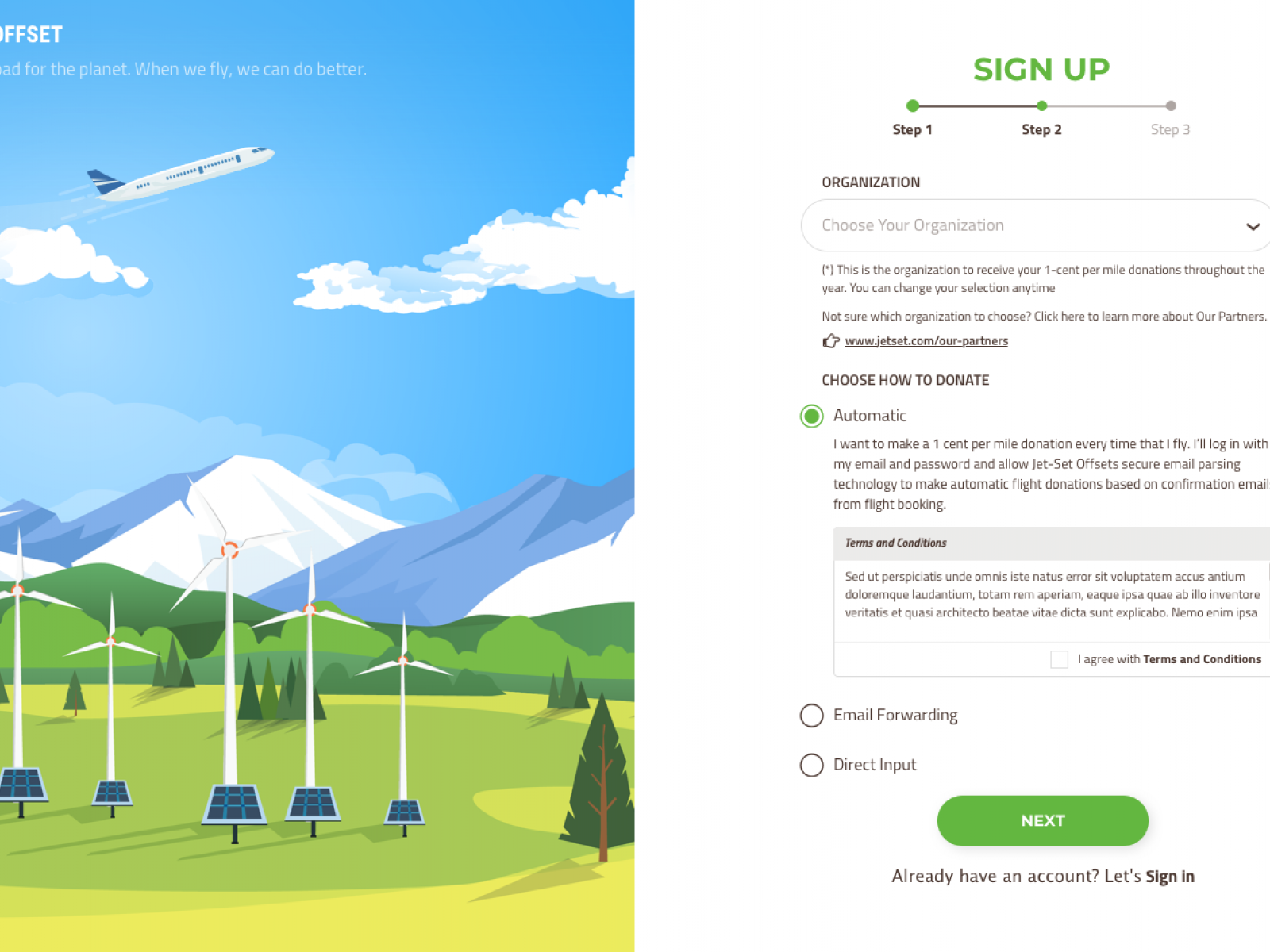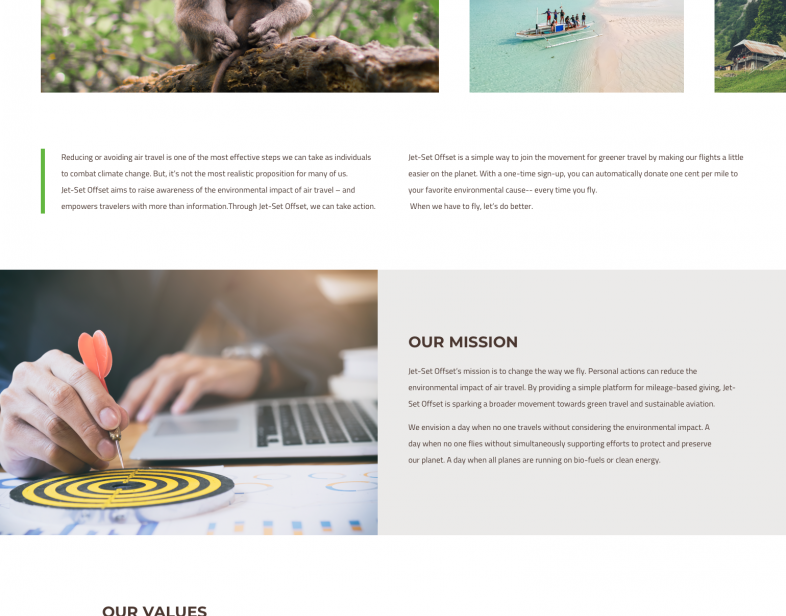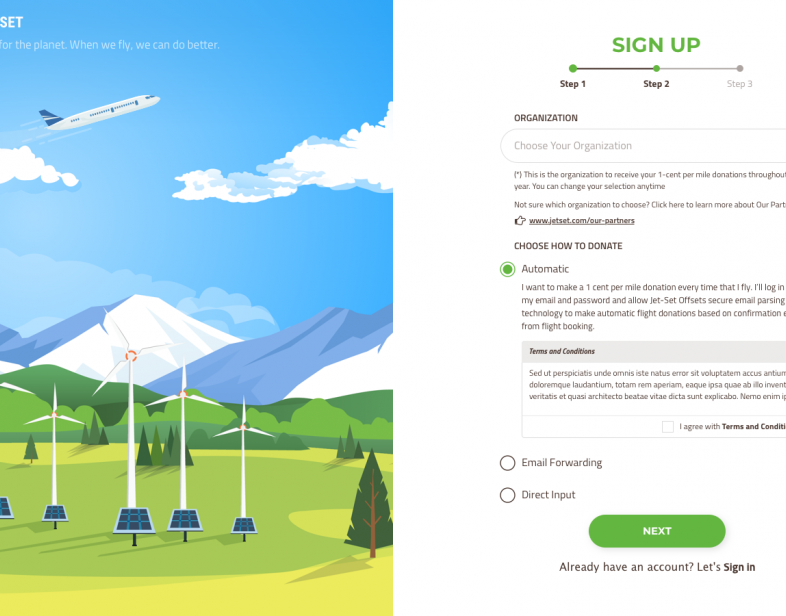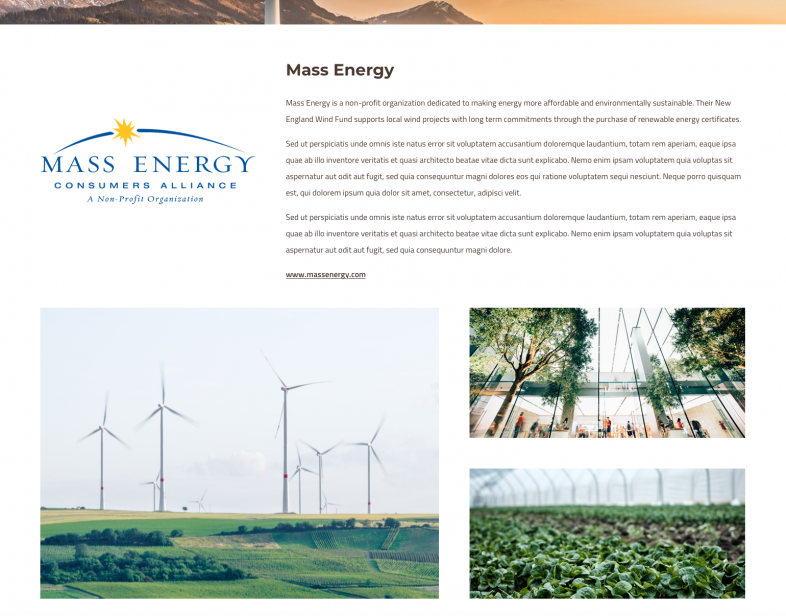An Overview Of Our Solution
Jet-Set Offset aims to raise awareness of the environmental impact of air travel and offers an innovative, consumer-friendly alternative to carbon offsetting. Our mission is to change the way we fly. As a web app, jetsetoffset.com facilitates mileage-based donations to non-profit environmental organizations. With a one-time sign-up for Jet-Set offset, you can automatically donate one cent per mile to your favorite environmental cause-- every time you fly. Jet-Set Offset is a simple way to make air travel greener. By providing travelers with a simple, yet inspiring platform for smarter travel and mileage-based giving, Jet-Set Offset is sparking a consumer-driven movement towards sustainable aviation.
- Population Impacted: 173 million Americans fly each year. Our goal is t
- Continent: North America
Context Analysis
Air travel is one of the largest contributors of carbon emissions in the United States and around the world. Reducing or avoiding air travel is one of the most effective steps an individual can take to combat climate change. Last year, Americans flew a record high 1.5 trillion miles. We are flying more every year, not less. Carbon emissions from jet-fuel have been increasing 4% per year. At current rates of passenger flight growth, air travel could account for over 25% of global carbon emissions by 2050. Our market research found that over 60% of travelers do not currently consider the environmental impact of their flights. For those that do, reducing air travel is not a realistic proposition for many business travelers, students, adventurers, or families living far apart. Those with a guilty conscience have few alternatives, and none of them are easy to find or use.
Describe the technical solution you wanted the target audience to adopt
Jet-Set offset takes the guilt out of air travel and offers users simplicity, automation, choice and credibility. Users will sign up at www.jetsetoffset.com with their email, create a profile, and select an environmental organization as the recipient of their mileage- based donations. Jet-set offset will seamlessly integrate with the user’s email and scan for flight confirmations. (Users may also choose to forward flight confirmation emails.) When flights are booked, donations will be made automatically based on the mileage of each flight at one cent per mile. Your Jet-set Offset profile will track your air miles and tax-deductible donations made annually and allow you to share the good you are doing on social media. Jet-Set Offset’s website will also be a source of information for eco-conscious travelers. On it, we will publish fuel efficiency and % bio-fuel data for all US flight routes, share eco-conscious travel tips, and launch a blog on air travel and climate change.
Type of intervention
Describe your behavioral intervention
We dream about a day when no one books a flight without first considering its environmental impact and no one flies without also supporting climate change efforts with a small mileage-based donation. Results from our consumer surveys of air travelers in the United States reveal that nearly 65% of travelers did not know that reducing air travel is one of the most effective steps an individual can take to combat climate change. Even when newly armed with that information, most admit that they are not able to change the amount that they fly. 56% of flyers say that they would donate one cent per mile to environmental organizations when they fly. Among travelers that fly over 25,000 miles a year, 66% are interested in Jet-Set Offset’s service.
Jet-Set Offset’s emotional appeal is grounded in awareness building that could bring guilt and frustration to today’s eco-conscious traveler. But, Jet-Set Offset simultaneously offers travelers a positive, action-oriented alternative, an opportunity to join a movement towards sustainable aviation. The movement will bring with it shared optimism, that through individual action and behavior change, we can make a difference in the fight against climate change. Consumer demand could also accelerate technological innovations in cleaner aircraft and jet-fuels.
As needed, please explain the type of intervention in more detail
In addition to an emotional appeal, Jet-Set Offset will motivate behavior change though social incentives. Users can share their Jet-Set Offset donations and the environmental organizations they are supporting when they jet-set on a public feed and through social media outlets. Giving is contagious, and potential donors are often influenced by others.
By publishing flight route data on fuel efficiency and bio-fuel usage, we hope to provide a new choice architecture for travelers exploring airlines and flight options before booking.
Describe your implementation
The carbon offsetting services that currently exist use a highly technical formula to purchase carbon credits. They are not particularly user-friendly or specific to air travel. The projects they support are often located outside of the United States. Jet-Set Offset will instead employ a donation-based model. Users will have the ability to choose local, US-based environmental organizations as the recipients of their donations.
We will first develop and launch the web technology. To reach early adopters, JSOS will focus on building partnerships with non-profit environmental organizations, who will in turn market JSOS to their existing members and donors. We will focus on US-based organizations and users and take a regional approach to implementation. For our pilot launch, we plan to partner with 2-5 local environmental organizations in New England. Findings from the proof of concept pilot will be used to fundraise, expand geographically, and strategically scale to meet our long-term goals.
Projected Implementation Timeline:
• New England Pilot: Jet-Set Offset plans to launch a local pilot program with three to five partnering environmental organizations, including Mass Energy’s New England Wind Fund.
• Diversify and Expand Partnerships
o Year 1: Jet-Set Offset aims to partner with 15 environmental organizations across new geographic regions and launch advertising campaigns.
o Year 2: Jet-Set Offset aims to partner with an additional 30 environmental organizations nationwide, and launch Jet-Set Offset’s web app services to 30 institutional and corporate partners.
• Scale-Up
o Year 3: Through increased multi-channel sales and marketing efforts, Jet-Set Offset anticipates reaching over 1 million users
o Year 4: Jet-Set Offset will increase non-profit partners and corporate customers each year.
External connections
Key partners in our solution development and pilot launch include program partners, such as Mass Energy and Mass Audubon. Mass Energy is a non-profit renewable energy organization in Massachusetts, and Mass Audubon is dedicated to land and wildlife. We will also work closely with student organizers from Harvard, MIT, and other universities and graduate schools during pilot implementation to test the concept by utilizing Jet-Set Offset to better capture travel data from and reduce the environmental impact of student treks and faculty air travel.
Who adopted the desired behaviors and to what degree?
Ultimate success for Jet-Set Offset will be measured by the number of partnering organizations and end users making mileage-based donations. We hope to build a mass movement of travelers empowered to make air travel more sustainable.
How did you impact natural resource use and greenhouse gas emissions?
We will soon launch the site and program. If we are successful at reaching our goals of 1 million users signing up for Jet-Set Offset over the next three years, over $340 million will be donated to environmental organizations. Applying methodologies from the American Carbon Registry and Environmental Protection Agency, we think these funds will allow our environmental partners to reduce nearly 5 million Metric Tons of CO2 emissions for every $25 million donated. Environmental partners must be 501c3 nonprofit organizations working to combat climate change trough a range of environmental missions including renewable energy, land conservation, afforestation, and carbon reduction.
What were some of the resulting co-benefits?
Building awareness will help travelers think twice about the necessity of air travel. Offering a positive alternative trough Jet-Set Offset’s website will inspire travelers to donate to environmental organizations when they fly. We are also hoping to build consumer demand for airlines and flight routes that utilize cleaner burning bio-fuels. Jet-Set Offset can become a platform for consumer advocacy for aviation emissions standards and policies that will support the development of innovative, greener aircraft technology.
Sustainability
Jet-Set Offset will rely on grant funding and investment for start-up costs, but will become financially sustainable and self-sufficient from market-based revenue. JSOS will operate as a fundraising organization. Jet-Set Offset will establish service agreements with partnering organizations that will include a 6% service processing fee for using the platform to cover the costs of technology and financial processing. Today, the average traveler flies five times a year, or 8,700 miles. Jet Set-Offset expects the average annual individual donation to be approximately $87. Jet-Set Offset’s annual revenue per user will be approximately $5. This will support email parsing and financial processing fees and marketing efforts.
Return on investment
Based on our estimates of annual revenue per user and projected start-up costs, we expect to reach ROI once we’ve reached one million users.
How could we successfully replicate this solution elsewhere?
If the New England pilot is successful, we plan to expand to other geographies across the United States by partnering with local organizations and geographically targeting marketing efforts. Our pilot program will inform customer acquisition costs, test our financial assumptions, and help refine projections the costs of regional expansion. We expect rapid nationwide expansion to require $500,000 in start-up funding from a combination of grants, investment, and pilot program revenues.








